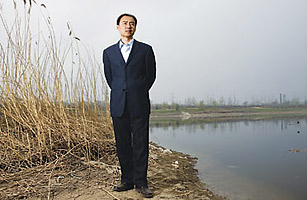
It's safe to say that if you put Ma Jun's face on a billboard in Beijing next to basketball star Yao Ming or screen beauty Ziyi Zhang, your average passerby wouldn't have a clue who Ma is. But those who know might argue that China needs heroes like him much more urgently than it does a sports giant or a movie star.
As the rapid industrial expansion of the world's most populous nation surges forward, China's decisions about how to use its natural resources and control its pollution will affect environmental health around the world.
Ma Jun's 1999 book China's Water Crisis may be for China what Rachel Carson's Silent Spring was for the U.S. — the country's first great environmental call to arms. A journalist turned environmental advocate, Ma has emerged as a powerful voice in China, raising the alarm about the potentially catastrophic consequences of heedless, unsustainable growth.
One might wonder how an individual takes on the policies of China's tightly controlled one-party state apparatus without great personal risk, but Ma, 38, is surprisingly optimistic.
"There is now more awareness of environmental rights and the rights of people as citizens," he told the New York Times last year. "For such a major problem, they believe they have the right to know about it and at least have their views heard. For the first time, there is some legal basis for public participation ... a major step forward."
My father Ed Norton Sr., who helped found the Nature Conservancy's landmark collaboration with the People's Republic in Yunnan province, says that during its first industrial century, the U.S. had plenty of time to learn from its mistakes. "China doesn't have that kind of time," he says. "They are going to have to learn faster and leapfrog the problems we created in the West."
It won't happen without people of courage and vision. People like Ma Jun.
Norton, the actor, will be seen next in Down in the Valley, which he also produced